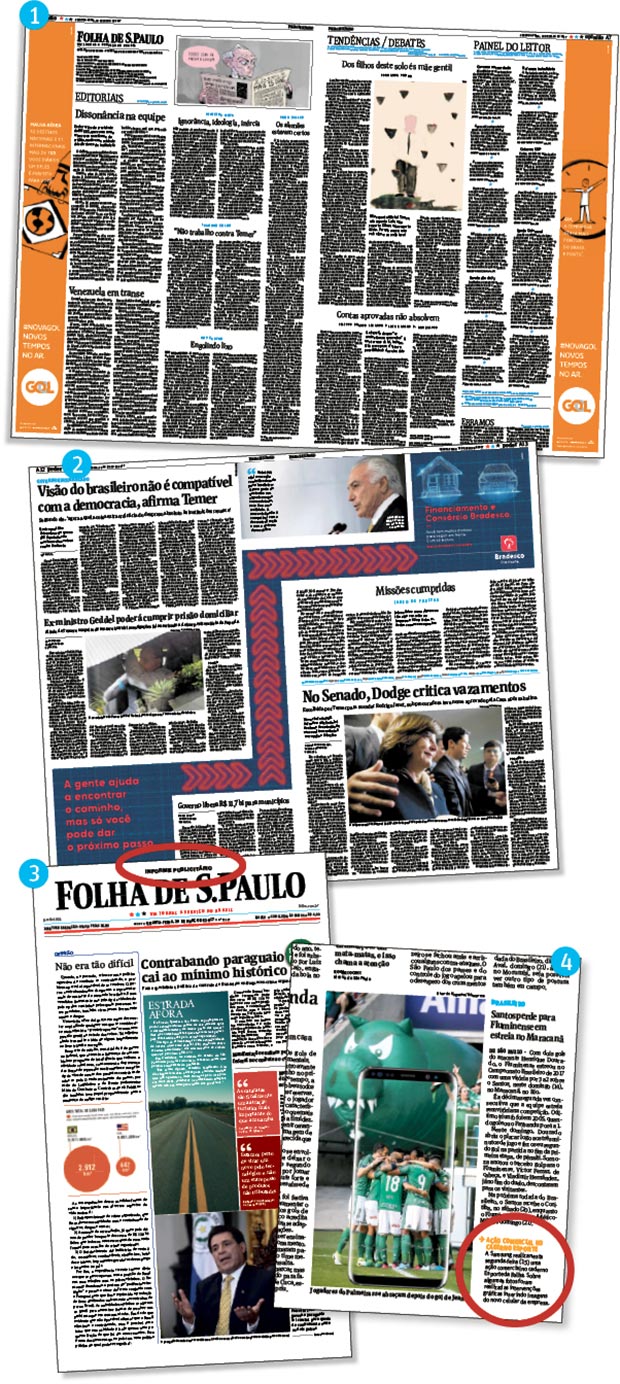Latest Photo Galleries
Brazilian Markets
11h33 Bovespa |
-0,49% | 124.123 |
16h43 Gold |
0,00% | 117 |
11h43 Dollar |
+0,41% | 5,1701 |
16h30 Euro |
+0,49% | 2,65250 |
ADVERTISING
How to Deal With an Avalanche of News?
07/17/2017 - 13h52
Advertising
PAULA CESARINO COSTA
There was no lack of important news in the week that just ended. Labor reform legislation was approved. Former President Luiz Inácio Lula da Silva was sentenced to nine and a half years in prison for corruption and money laundering. The Constitution and Justice Commission of the lower house of Congress rejected a recommendation to try Brazil's president Michel Temer for corruption. A new Prosecutor-General was nominated.
Such impactful news stories, coming one after another, dominated the digital editions of newspapers every day and generated a creativity challenge for the print editions to maintain interest and relevance. During the week, a sense of redundancy between the digital and print versions was noted by readers on different platforms, indicating that the challenge wasn't being met.
On Wednesday (12th), for example, all of the major newspapers reserved their headlines for labor reform. Folha's declaration was dry, without any attempt at interpretation or exploring potential consequences: "Senate approves labor reform".
The text on the frontpage declared that labor reform is "supported by business leaders and opposed by parties from the left and labor unions". Inside pages made reference only to labor unions. Information and opinion from those primarily interested and affected was lacking. And there could be a tool for reporting on it.
Datafolha polling reveals that a majority of Brazilians are opposed to labor reform. The majority say that they believe that the reform benefits businesses more than workers. A table published in that edition confirmed this perception by highlighting 15 labor reform points, 2 potentially disadvantageous for businesses and 13 potentially disadvantageous for workers.
Where I am headed with all of this is that coverage of decisions made by the Executive, Legislative and Judiciary seems to always be packaged up in the offices of the respective powers themselves.
The effects on the lives of those who are directly interested and affected is generally underestimated. There were few reports with concrete examples of the changes that the reform would provoke, either for workers or for companies.
In reporting on Lula's sentencing, Folha's coverage was more restrained than that of its competitors, abdicating the historic treatment that the moment demanded. The newspaper maintained its emphasis on offering other viewpoints, providing a wide range of analysis, but didn't have any reporting or editing that stood out.
In the midst of so much news, it failed to reveal anything unexpected or otherwise showing Folha to be essential.
Somewhere Between Innovation and Disfigurement
Folha has previously been circulated in a format all made up, colored in blue, with headlines in English and advertising running throughout its pages. The creativity of advertisers on the one hand, and the search for advertising revenue by the commercial area on the other, didn't just now start interfering in Folha's (and other newspapers') formatting. Often, these initiatives irritate readers.
This week, the first section of the newspaper was printed on paper a few centimeters wider to fit in an advertisement from Gol. Readers complained of difficulty in handling the paper.
Folha Group's Commercial Executive-Director, Marcelo Benez, explained that "this first-ever advertising message space provided the reader with a greater and more extensive amount of editorial content than in typical editions, where ads and editorial content normally are run side-by-side". Gol was the exclusive advertiser of that edition's first section. By creating an extra column for advertising, the pages were freed up for more news stories.
In May, commercial interests at Samsung modified photos that were published. One reader said that he felt "deceived". Another questioned whether the reporting was "sponsored". The doubt that was raised serves as a warning as to the risk that the newspaper can run, that of crossing the line between commercial and editorial boundaries.
For Sérgio Dávila, Folha's editor-in-chief, the unusual sensation is "understandable". "We believe, however, that such initiatives show the vitality of the print edition of the newspaper. As the editorial project states, we believe that diversified advertising, free of restrictions, is essential to maintaining the independent journalism that we practice here."
A newspaper that is innovative in advertising is also reinvigorating for the media, for sure. However, if it tampers too much with its own characteristics, it runs the risk of losing its identity with readers.
Translated by LLOYD HARDER
Read the article in the original language
| Folhapress | ||
 |
||
| UNCOMFORTABLE AND DISORGANIZED (JULY 10 and 13, 2017) 1. Advertising space from Gol increased the width of the newspaper's pages. 2. Bradesco, in a more frequent move, removed its column from its typical location. 3. FALSE FRONTPAGE (March 29,2017) Looking very similar to the newspaper itself, it contained a discrete statement written in small text alerting that it was an advertisement. (May 15, 2017). Samsung commercial interests modified published photos removing explanatory text. |



